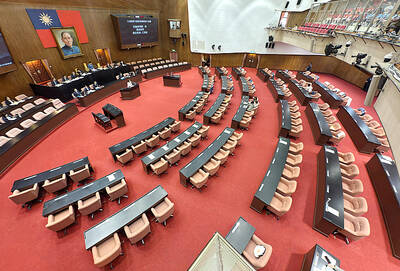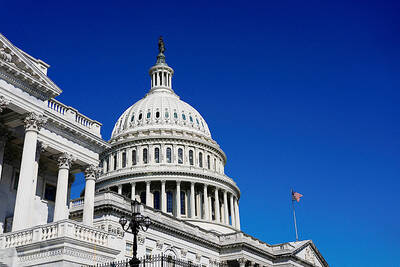Chinese security officials accused four detained staff of Anglo-Australian miner Rio Tinto Ltd of bribery yesterday as Australia sought to avert a diplomatic row centered on the massive iron ore trade.
The Shanghai office of China’s State Security Bureau accused the three local Rio staff and senior Australian executive Stern Hu (胡士泰) of bribing Chinese steelmakers during tense iron ore price negotiations this year, the China Securities Journal said.
“This seriously damaged China’s economic security and interests,” said the paper, which is published by the state-run Xinhua news agency. “The activities of Stern Hu and the others violated Chinese law as well as international business morality.”
The shock detentions have cast a shadow on relations between Beijing and Canberra, whose economies have been welded together in recent years by China’s huge demand for Australian metals and minerals.
China’s ambassador to Australia was summoned to the foreign ministry late on Thursday to discuss what local newspapers said was a fast-escalating crisis, after Chinese security authorities arrested the four on Sunday, alleging they were involved in stealing state secrets.
“In 2009 during negotiations between Chinese and foreign companies on iron imports, Hu and his people used illegal methods by bribing personnel of Chinese steel production units to steal Chinese national secrets, which caused damage to China’s national economic safety and interests,” local newspapers said, citing a statement from the Ministry of State Security, China’s main internal intelligence agency.
The material included summaries of meetings of Chinese negotiators, the newspaper 21st Century Business Herald said, citing unidentified sources. It said that would allow Rio to know “the Chinese iron ore negotiating team’s bottom line.”
China is pressing iron ore suppliers for sharp price cuts following several years of repeated increases. The other major suppliers are Australia’s BHP Billiton Ltd and Brazil’s Vale SA.
China’s communist government regards steel as a strategic industry and treats a wide range of economic data as secret. Information on steel company ore costs, profits and technology spending all are considered secrets, news reports said.
Australian Foreign Minister Stephen Smith told reporters in Perth that China appeared to have a “broader” definition of what amounted to industrial espionage than many other countries.
“It’s very hard for the Australian government to see the connection between what might be daily commercial and economic negotiations and national security issues,” he said. “Having said that, Mr Hu now ... runs the risk of being subject to Chinese criminal, legal and judicial processes.”
Rio is “surprised and concerned” about the allegations, said a company spokesman in Melbourne.
“We are not aware of any evidence that would support these allegations. Rio Tinto is committed to high standards and business integrity and takes its ethical responsibilities very seriously,” spokesman Tony Shaffer said.
Chinese authorities have not given Rio any information about the case, Shaffer said.
“We remain ready to assist these authorities in their investigations,” he said. “We will continue to support our employees and their families in China.”
Rio said on Thursday it knew of no evidence to support spying accusations.
Employees of the China Iron & Steel Association (中國鋼鐵工業協會), the negotiator for Chinese steel producers, are also under investigation, the Herald said. The Shanghai newspaper Oriental Morning Post said Chinese steel companies are also being investigated.
An executive who oversaw iron ore purchases for a major Chinese steel producer, Shougang Group (首鋼), was detained this week, the Herald reported. A foreign ministry spokesman declined on Thursday to say whether that was linked to the Rio case.
The arrests came after the two sides missed a June 30 deadline for iron ore talks and Rio’s ditching of a US$19.5 billion tie-up with Chinese state metals firm Chinalco (中國鋁業) last month.
Chinalco, Rio’s major shareholder, said the arrests were unrelated to dealings between the two firms and expressed “mutual concern for the current situation with their staff.”
Australian Prime Minister Kevin Rudd, a Mandarin-speaking former diplomat, said on Thursday he had no plans to call Chinese President Hu Jintao (胡錦濤) to discuss the case, the Australian Associated Press news agency reported.
“The advice from our consular officials is to work step by step, and we will raise it at whatever level of the Chinese leadership is necessary at the relevant time,” Rudd said during an official visit to Rome.

The Chien Feng IV (勁蜂, Mighty Hornet) loitering munition is on track to enter flight tests next month in connection with potential adoption by Taiwanese and US armed forces, a government source said yesterday. The kamikaze drone, which boasts a range of 1,000km, debuted at the Taipei Aerospace and Defense Technology Exhibition in September, the official said on condition of anonymity. The Chungshan Institute of Science and Technology and US-based Kratos Defense jointly developed the platform by leveraging the engine and airframe of the latter’s MQM-178 Firejet target drone, they said. The uncrewed aerial vehicle is designed to utilize an artificial intelligence computer

The Chinese Nationalist Party (KMT) caucus yesterday decided to shelve proposed legislation that would give elected officials full control over their stipends, saying it would wait for a consensus to be reached before acting. KMT Legislator Chen Yu-jen (陳玉珍) last week proposed amendments to the Organic Act of the Legislative Yuan (立法院組織法) and the Regulations on Allowances for Elected Representatives and Subsidies for Village Chiefs (地方民意代表費用支給及村里長事務補助費補助條例), which would give legislators and councilors the freedom to use their allowances without providing invoices for reimbursement. The proposal immediately drew criticism, amid reports that several legislators face possible charges of embezzling fees intended to pay

REQUIREMENTS: The US defense secretary must submit a Taiwan security assistance road map and an appraisal of Washington’s ability to respond to Indo-Pacific conflict The US Congress has released a new draft of the National Defense Authorization Act (NDAA), which includes up to US$1 billion in funding for Taiwan-related security cooperation next year. The version published on Sunday by US House of Representatives Speaker Mike Johnson removed earlier language that would have invited Taiwan to participate in the US-led Rim of the Pacific Exercise (RIMPAC). A statement on Johnson’s Web page said the NDAA “enhances U.S. defense initiatives in the Indo-Pacific to bolster Taiwan’s defense and support Indo-Pacific allies.” The bill would require the US secretary of defense to “enable fielding of uncrewed and anti-uncrewed systems capabilities”

Renewed border fighting between Thailand and Cambodia showed no signs of abating yesterday, leaving hundreds of thousands of displaced people in both countries living in strained conditions as more flooded into temporary shelters. Reporters on the Thai side of the border heard sounds of outgoing, indirect fire yesterday. About 400,000 people have been evacuated from affected areas in Thailand and about 700 schools closed while fighting was ongoing in four border provinces, said Thai Rear Admiral Surasant Kongsiri, a spokesman for the military. Cambodia evacuated more than 127,000 villagers and closed hundreds of schools, the Thai Ministry of Defense said. Thailand’s military announced that